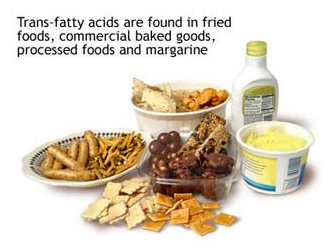
6. Trans fat increases heart disease and diabetes not saturated fat
![]()
 A systematic review of currently available observational studies have concluded that, while trans fats are associated with a greater risk of death and coronary heart disease, saturated fats are not. The results are published in the August 2015 edition of The BMJ.
A systematic review of currently available observational studies have concluded that, while trans fats are associated with a greater risk of death and coronary heart disease, saturated fats are not. The results are published in the August 2015 edition of The BMJ.
![]() Saturated fats typically come from animal products such as meat, egg yolks, butter, milk and salmon and some plant products such as chocolate and cocoa butter, coconut oil etc. and trans-fats are produced industrially from plant oils and found in margarine, packaged baked goods and snack foods.
At present, dietary guidelines recommend limiting saturated fat consumption to less than 10% of daily energy intake to reduce the risk of ischemic heart disease and stroke. Guidelines also recommend that trans fat consumption should be less than 1% of energy.
Saturated fats typically come from animal products such as meat, egg yolks, butter, milk and salmon and some plant products such as chocolate and cocoa butter, coconut oil etc. and trans-fats are produced industrially from plant oils and found in margarine, packaged baked goods and snack foods.
At present, dietary guidelines recommend limiting saturated fat consumption to less than 10% of daily energy intake to reduce the risk of ischemic heart disease and stroke. Guidelines also recommend that trans fat consumption should be less than 1% of energy.
![]() The researchers pooled data from studies investigating the associations of saturated fats and trans-fats with all-cause mortality, coronary heart disease, cardiovascular disease deaths, ischemic stroke and type 2 diabetes. The researchers could not find any clear associations between high intake of saturated fats and with health problems in the studies involving saturated fats, although they were unable to rule out the possibility that it could increase the risk of death from coronary heart disease.
The researchers pooled data from studies investigating the associations of saturated fats and trans-fats with all-cause mortality, coronary heart disease, cardiovascular disease deaths, ischemic stroke and type 2 diabetes. The researchers could not find any clear associations between high intake of saturated fats and with health problems in the studies involving saturated fats, although they were unable to rule out the possibility that it could increase the risk of death from coronary heart disease.
![]() In the studies involving tran-fats, however, the researchers found that the trans-fat consumption was associated with a 34% increase in all-cause mortality, a 21% increase in the risk of coronary heart disease and a 28% increase in the risk of death from coronary heart disease.
In the studies involving tran-fats, however, the researchers found that the trans-fat consumption was associated with a 34% increase in all-cause mortality, a 21% increase in the risk of coronary heart disease and a 28% increase in the risk of death from coronary heart disease.
For enquiries info@jothydev.net.
Please visit: jothydev.net | research.jothydev.com | diabscreenkerala.net | jothydev.com/newsletter
